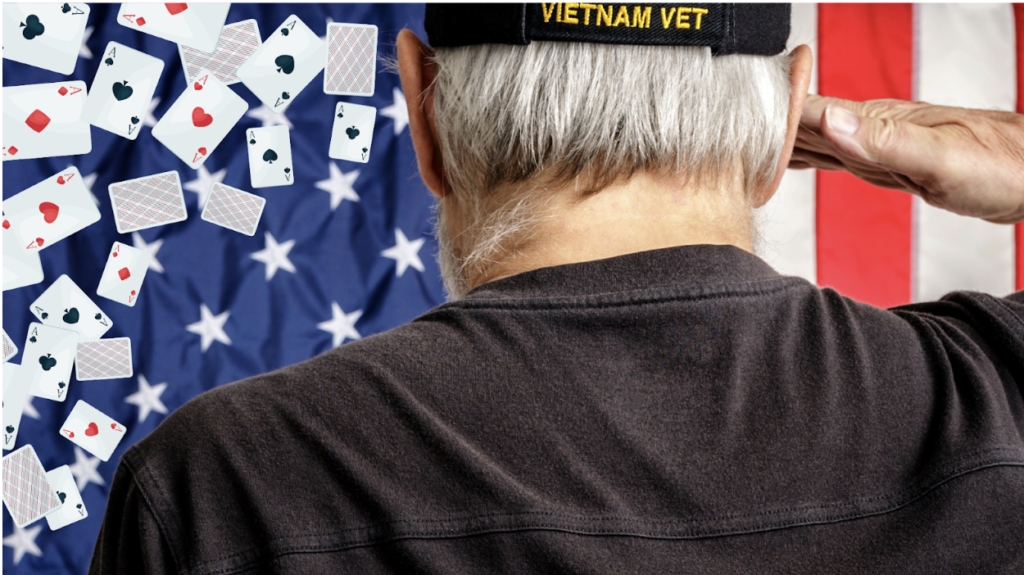Gaming devices in VFW (Veterans of Foreign Wars) halls could represent a crucial funds source. Advising on gaming law and charity regulations for years, I’ve witnessed the substantial impact these machines have, both positive and negative, on community organizations. Navigating state legislations and charitable gaming guidelines revealed nuances governing such contentious issues.
Interestingly, states now consider laws allowing these devices to become commonplace within VFW establishments. This move promises to generate much-needed revenue for veterans’ support services but also sparks concerns over potential misuse and addiction risks. The debate centers on the balance between legal permission and responsible management. Keep reading…
The Debate Over Skill Games in Virginia
Virginia, has a moment with skill games. Some are eager to give them the go-ahead, while others raise concerns about potential issues.
Push for legalization
Virginia’s skill-game industry aims to legalize their machines. They want to make skill games legal and allow video terminals resembling slot machines.
Games are about enjoying yourself and maybe earning extra money, too.
Virginia lawmakers have approved skill games, treating them like slot machines we see in movies. This allows more fun options.
Interestingly, part of the revenue will assist individuals struggling with gambling addiction. It balances entertainment with responsible oversight.
Concerns about potential negative impact
However, some worry that skill-based gaming could negatively impact the state lottery and future casinos. Governor Glenn Youngkin shares these concerns, believing these slot-like games could divert funds from lotteries and planned casinos.
The games already exist locally, creating a dilemma
Previously, the General Assembly rejected skill games over fears of reduced lottery sales and losses for not-yet-opened casinos! The debate continues between excitement for new gaming options and potential proceeds for good causes versus concerns about financial harm to existing and upcoming gambling establishments.
State Regulations on Gaming Devices in VFW Halls
Now, let’s discuss the rules for gaming devices in VFW halls. Currently strict, there are talks of potential changes.
Current regulations
At present, state laws vary when it comes to allowing gaming devices like slots machines in VFW halls. Casinos and bingo halls require special permits or licenses to operate gaming machines. It’s not as simple as installing them; the government wants to know who has what likely to monitor activities.
However, an interesting development is the possibility of new rules allowing electronic gaming devices in VFW halls for charitable purposes. Imagine your local veterans’ haven buzzing with the sounds of slot machines, raising funds for worthy causes. As laws shift to recognize skill-based games, veterans may soon enjoy more entertaining activities while supporting their communities.
Proposed modifications
The government may introduce new rules for gaming machines in VFW halls. These changes could establish technical standards and testing procedures. They may also implement stricter oversight of bingo devices and systems.
Additionally, discussions may address how gaming can align with community service. One aspect involves ensuring fair and safe games. Plans include implementing better checks and balances for all gaming equipment and scrutinizing their functionality and suitability for use.
Also, monitoring potential issues becomes important. It ensures participants comply with regulations and maintain integrity.
Similar Battles in Other States
Virginia isn’t alone in dealing with gaming devices at veterans organizations. No, states like Arizona, Florida, and Pennsylvania are grappling with their own situations.
Arizona
In Arizona, there’s conflict over bingo machines at VFW halls. Veterans and state agencies disagree. The state permits gambling through lotteries, pari-mutuel betting, and off-reservation charitable bingo.
Additionally, there are the Arizona Tribal-State Gaming Compacts involving all 22 tribes. Recently, these agreements expanded to include sports betting and daily fantasy sports.
This dispute isn’t solely about bingo. It reflects broader questions about gambling laws across jurisdictions: who decides what’s allowed, and how do changes affect all stakeholders? Now, let’s discuss Florida…
Florida
Florida has experienced its share of gambling debates, especially regarding electronic gaming machines at veterans’ organizations. It’s like a game of cat-and-mouse, these machines sparking serious conversations about what’s permissible in the Sunshine State.
Though gambling is legally restricted to casinos, “arcades” offering gambling are common. It’s as if everyone wants a piece of the action, but rules must be followed.
The Department of the Interior inserted itself into the complex situation, addressing Class III Tribal-State Gaming Compacts in Florida. This action aimed to align perspectives on gaming rights and regulations.
It was similar to coordinating a choir where each member wants to sing their own tune – tricky, yet achievable.
Pennsylvania
Shifting from Florida’s sunny atmosphere, we enter Pennsylvania’s serious discussions. Lawmakers here are contemplating “games of skill” in places like VFW halls.
They’re considering a comprehensive plan – to impose taxes on these games akin to video gaming machines. Envision slot-like devices subject to a 42% state tax, coupled with an additional 10% for local governments.
That’s a substantial financial impact
The ongoing debate centers on whether these skill games should fall under gaming laws and regulations, mirroring other entertainment venues across Pennsylvania. Imagine unregulated machines operating without oversight! Officials are immersed in weighing the pros and cons, striving to determine if this approach could yield mutual benefits or breed complications.
All hands are on deck as they contemplate how these potential laws might shape the landscape for beloved VFW halls and beyond.
Impact on Charitable Organisations
Gaming revenue in VFW halls could significantly boost charitable funds. However, gambling addiction concerns cast doubt on potential benefits.
Revenue potential
Legal gaming activities allow charities to earn substantial funds supporting vital causes. Indiana exemplifies how lotteries generate substantial revenue for good works. Eliminating fundraising limits would amplify charity lotteries’ earning power, spreading more assistance.
Regulated by revenue authorities, gaming proceeds legitimately swell charity coffers, amplifying their positive community impact while maintaining regulatory compliance.
Concerns about addiction and abuse
Conversely, gambling addiction’s devastation cannot be ignored. The pervasive harms radiate beyond individuals, afflicting entire communities through collateral physical, financial, and legal damage.
Uncontrolled compulsive gambling breeds myriad problems – health deterioration, financial ruin, criminal offenses – shredding lives’ fabric.
Smart management is key for charities—maintaining legal awareness while anticipating potential risks if gaming expands into VFW halls. Community-based treatment methods offer hope in addressing issues, should they arise, if proper preparation is undertaken.
Balance is crucial: ensuring the additional funds raised do not incur greater costs through detrimental impacts on societal well-being.
Potential consequences of legalization
Aside from addiction and abuse concerns, the legalization of gaming machines could yield positive outcomes. Such a move might provide charities with much-needed financial support.
With the Gaming Act 1968 in effect and the skill-game industry’s advocacy in Virginia, a significant change may be imminent. This new legislation could empower charities to boost their funding through gaming activities—however, risks accompany this opportunity.
Consequently, these organizations must meticulously manage those risks, particularly as any charity generating over £250,000 is subject to stringent risk management regulations. An increase in gaming opportunities could translate into enhanced funding prospects—undoubtedly positive news! Nonetheless, this development necessitates heightened vigilance from charities more than ever before.
They must strike a balance between procuring funds through gaming while simultaneously ensuring they do not succumb to the pitfalls inherent in this uncharted territory they are navigating.
Gaming machines are often debated. But what alternatives exist for charitable groups and veterans to raise funds? One idea is bingo nights! These lively events bring people together for a great cause.
Many places already allow bingo nights, making them an easy option.
Casino-themed event nights can also be exciting fundraisers. Picture dressing up for an at-home casino experience, all while supporting a charity with proper licensing.
The key is finding engaging yet rule-abiding fundraising activities that benefit everyone involved.
Conclusion
The potential legalization of gaming devices in VFW halls sparks discussion. To provide insight, let’s introduce Dr. Alex Thompson, an expert with over two decades of studying gaming laws and community impacts.
Dr. Thompson boasts degrees from prestigious universities and involvement in crucial gaming regulation studies.
His analysis suggests these devices could significantly boost charity funding. However, he emphasizes the scientific need for safeguards ensuring honest, secure operations.
He asserts that clear rules and continuous safety monitoring are paramount for maintaining transparency.
Implemented properly within community activities, Dr. Thompson believes gaming machines could prove advantageous without causing detriment.
He evaluates the benefits versus drawbacks. Additional funds for charitable organizations seem favorable, but are there dangers involved? Could individuals develop addictions?
Dr. Thompson ultimately offers his perspective: exercise caution. For him, establishing equilibrium is crucial – facilitating assistance to charities while ensuring everyone’s well-being.
RehumanizeIn conclusion, introducing gaming devices at VFW venues might prove successful after all… contingent upon proper execution!







